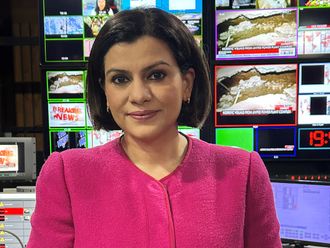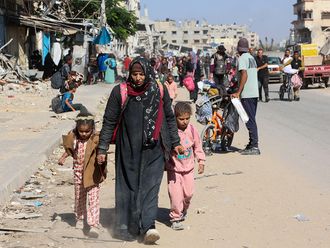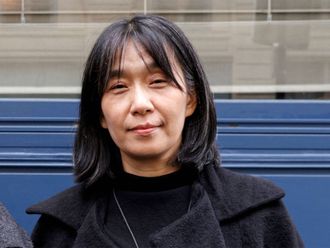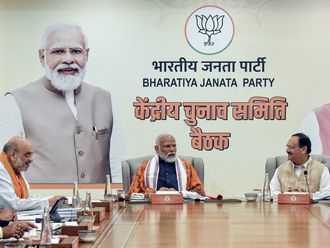India's External Affairs Minister S.M. Krishna was in Washington last week for discussions with US Secretary of State Hillary Clinton and other senior officials for what was euphemistically described as a "strategic dialogue", which self-congratulating Indian officials hailed as a "grand success".
Though the progress made in US-India relations since the suspicion of the Cold War is significant, this latest dialogue in Washington was disappointing for several reasons. For one, the US did not clearly support Delhi's role in Afghanistan, which is crucial for India's security. America's reticence is prompted by Pakistani opposition to India's growing influence in Afghanistan. India has provided massive assistance — $1.3 billion (Dh4.8 billion) — for Afghanistan's reconstruction.
This is causing heartburn in Pakistan, which would like to curb India's growing influence.
Krishna emphasised the need for closer US-India cooperation to counter transnational terrorism. He cited the botched car-bombing attempt by a Pakistani-American at New York's Times Square to support his argument that there was a need to crack down on the "epicentre of this threat in India's neighbourhood", and lamenting that American anti-terrorism efforts were too narrowly focused on Al Qaida.
Krishna should call a spade a spade. Frankness characterises the tone of strategic dialogue, with each side taking cognisance of the other's interests.
The US also took refuge in platitudes instead of wholeheartedly endorsing India's claim for a permanent seat on the UN Security Council, although permanent members Russia, Britain and France have unequivocally supported India's bid.
Let's be honest: India is not a priority for US President Barack Obama. This is evident from the administration's key India-related appointments in the State Department, whose broad and general competence — rather than particular expertise — could lead the president to make the wrong decisions, shaking the pillars on which bilateral relations rest.
Among the experts Obama and Secretary of State Hillary Clinton have surrounded themselves with is Under Secretary of State for Political Affairs William Burns, who did the troubleshooting before last week's dialogue. Burns, an astute diplomat, specialises in the Middle East and Russia, and the issue of sanctions against Iran takes up much of his time lately. Naturally, his performance on India will be measured against the benchmarks set by his predecessor Nicholas Burns [the two are not related] who was closely associated with the Bush administration's policy on India, persuading former secretary of state Condoleezza Rice to forge closer ties with India and finalise the historic civilian nuclear agreement with India.
Then there is Assistant Secretary for South and Central Asia Robert Blake, who manages the US-India relationship. Blake is a well-respected former ambassador to Sri Lanka and deputy chief at the US mission in Delhi. But Blake is a ‘sherpa' who facilitates the ascent of the climbers; he replaced Richard Boucher, a former Bush spokesman, who fell out with Richard Holbrooke, Obama's special envoy on the Afghanistan-Pakistan region.
Assistant Secretary of State for East Asian and Pacific Affairs Kurt Campbell champions the growing US-India ties, but he tends to look at the relationship from a broad Asian perspective. This "dilutes" the US focus on India.
Despite the bonhomie the US hosted a lavish banquet to celebrate the dialogue, with Obama making a cameo appearance to announce he would visit India in November — India still does not get the attention that China, as a strategic partner, does. India is partly to blame Prime Minister Manmohan Singh and Congress party leader Sonia Gandhi have not effectively articulated, let alone asserted, India's interests vis-à-vis Washington. Both seem only too willing to oblige any US demand without insisting on a quid pro quo. As a result, the Obama administration takes India for granted.
Disturbing allegations
Obama could do a lot more to pressure Pakistan's military and its Inter-Services Intelligence agency. Pakistani-American terrorist David Headley, who was interrogated in detention by Indian investigators recently, alleged that these Pakistani institutions were involved in the planning of the Mumbai attacks. These claims contradict the Pakistani argument that no state actors were involved in terrorist attacks on India.
Meera Shankar, India's ambassador in Washington, spoke of "yet another success" scored by Indian investigators in interrogating Headley. However, real success would be achieved if Pakistan were to hand over the terrorists responsible for attacks on India and make greater attempts to prevent similar incidents in future.
Manik Mehta is a commentator on Asian affairs.









